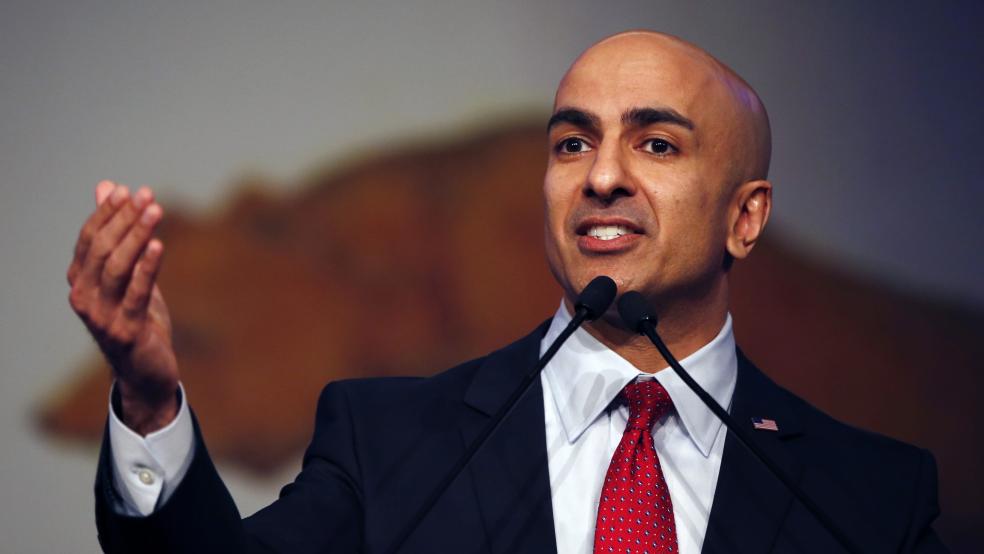Presidential candidates are presently arguing over whether large financial institutions need to be reined in further or ought to be loosed from the shackles of the Dodd-Frank Act, which imposed new rules on them in the wake of the financial crisis. Now, a former Bush administration official who helped oversee the bailout of the banking industry in 2008 and 2009 is weighing in with the suggestion that new regulations aren’t enough: big banks must be broken up.
Neel Kashkari hardly seems the sort to advocate an assault on the banking industry. A former Goldman Sachs banker, he served as acting Assistant Secretary of the Treasury for Financial Stability at the end of the George W. Bush administration and through the first few months of the Obama administration, managing the Troubled Assets Relief Program (TARP), commonly known as the bank bailout.
Related: A Bailout for Volkswagen? Congress Wants to Do Something Absolutely Crazy
A Republican, Kashkari launched an unsuccessful bid to unseat California Gov. Jerry Brown in 2014, and last October, he became the president of the Federal Reserve Bank of Minneapolis.
However, in a speech at the Brookings Institution in Washington on Tuesday he said that in the past six years, he has come to the conclusion that while the Dodd-Frank Act, took important steps to protect the US economy from reckless financial institutions, it did not do enough to mitigate the danger of “Too Big to Fail” banks.
In general, banks are considered too big to fail when they become so large that their failure would have an outsized, possibly catastrophic, effect on the larger economy. Rather than allow them to go under, the thinking goes, the government would have to take heroic steps to save them to maintain financial stability, possible in the form of a taxpayer-funded bailout.
This creates a raft of associated problems, including a sense of security among bankers that can lead to more risk-taking, and certainty of a government bailout that reduces incentives for customers, investors, and bondholders to do their due diligence.
Related: Congress Weakens Obamacare by Limiting ‘Bailout’ Funds for Insurers
Dodd-Frank was supposed to set up structures that allowed for the orderly resolution of troubled banks, which would assure that no bank is too big to fail. Treasury Secretary Jack Lew has repeatedly assured the public that the era of TBTF, as it is known, is over.
Many economists and banking experts believe that in a crisis no US presidential administration would be willing to take the risk of crashing the economy by letting a major bank fail. Now, Kashkari can be added to that list.
“While significant progress has been made to strengthen our financial system, I believe the [Dodd-Frank] Act did not go far enough,” he said. “I believe the biggest banks are still too big to fail and continue to pose a significant, ongoing risk to our economy.”
Kashkari urged Congress “to consider going further than Dodd-Frank with bold, transformational solutions to solve this problem once and for all.”
Related: FDIC Says ‘Too Big to Fail’ Bailouts Could Happen Again
Some of the “transformational solutions” he wants regulators to consider are as radical as anything being pushed by left-leaning Democrats, like Vermont senator and presidential candidate Bernie Sanders and Massachusetts Sen. Elizabeth Warren.
“I believe we must begin this work now and give serious consideration to a range of options, including the following:
- Breaking up large banks into smaller, less connected, less important entities.
- Turning large banks into public utilities by forcing them to hold so much capital that they virtually can’t fail (with regulation akin to that of a nuclear power plant).
- Taxing leverage throughout the financial system to reduce systemic risks wherever they lie.”
Sanders has vowed to break up the biggest banks in his first year as president. Even Democratic frontrunner Hillary Clinton, generally seen as more friendly to Wall Street than Sanders, has said she is in favor of taking apart the largest banks.
Kashkari said that he had dedicated the Minneapolis Fed to developing an “actionable plan” for ending TBTF. The bank is currently soliciting papers and ideas, and, Kashkari said, will present its findings by year-end.
To nobody’s surprise, representatives of the largest financial services firms aren’t on board with him. Tim Pawlenty, president and CEO of the Financial Services Roundtable said in a statement Tuesday afternoon, “New regulations requiring dramatically larger reserves and significantly decreased risk were enacted to end ‘too big to fail’ and bailouts. Those regulations should be finalized and their impact fully studied before policymakers can credibly call for them to be repealed and replaced with actions that could put American banks at a major global disadvantage and have other unintended consequences.”





